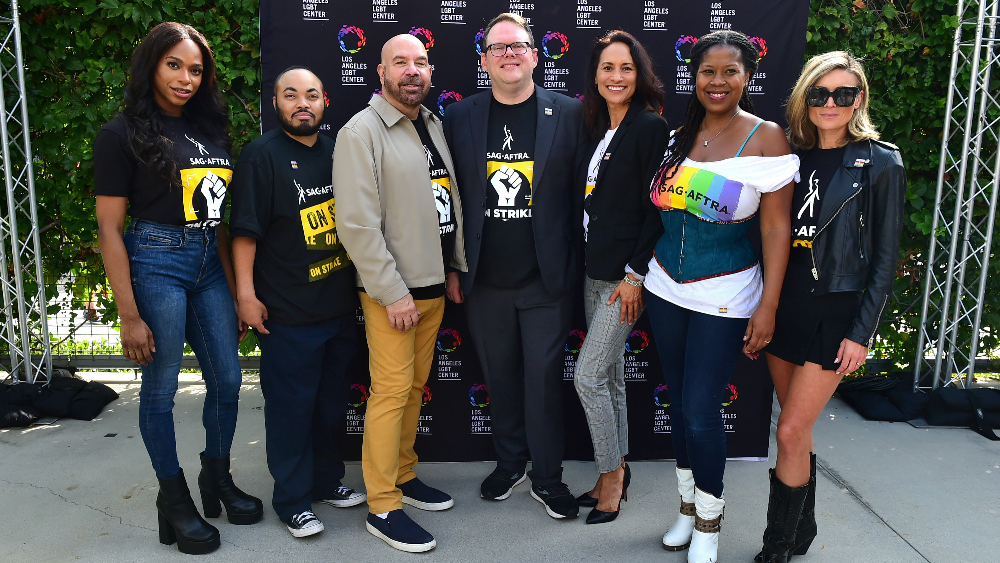
Media watchdog GLAAD released its Studio Responsibility Index on Thursday, using its annual ranking of queer representation in mainstream films to stand with striking unions SAG-AFTRA and the Writers Guild of America.
Convening in-person at the Los Angeles LGBTQ Center’s Ed Gould Plaza in Hollywood, leadership from both show business unions, queer talent and GLAAD CEO Sarah Kate Ellis spoke of the dangers that work stoppages from the strokes pose to inclusive storytelling.
“The fight for worker empowerment and the fight for authentic LGBTQ plus representation in media is all part of the same struggle,” said Duncan Crabtree Ireland, chief negotiator for the actors union. Crabtree Ireland’s profile has risen significantly since he appeared alongside SAG-AFTRA president Fran Drescher at their fiery strike announcement press conference in July. He took the GLAAD event as a moment to make the personal political.
“I’m here on behalf of our 160,000 members who are actors and other types of media artists. I’m also here as a member of the LGBTQ+ community, and as a father of five,” he said. “It’s been so heartening to watch my kids grow up seeing the authentic and nuanced representation of the full human experience in media that, frankly, as someone who grew up in a different era and in a different part of this country, I rarely saw on movies or television.”
Crabtree Ireland concluded that it was essential that such content “continues to enter the production pipeline, and that diverse performers and writers are able to get back to work.”
As the strikes drag closer to the five-month mark, reports of financial hardships and evictions for entertainment workers have been widespread. The press conference’s setting provided a needed dose of reality for what was at stake. The Ed Gould Plaza provides emergency shelter, mental health treatment, housing, and substance use and recovery services for the Los Angeles community, the LBGTQ Center’s communications head Phillip Picardi said.
Other notable speakers included WGA vice president Michele Mulroney, co-chair of SAG-AFTRA’s national LGBTQ Committee Jason Stuart, JJ Wienkers-Alvendia and Spiro Skentzos of the WGA LGBTQ+ writers committee, and actor-writer Alexandra Gray (who, along with Stuart, revealed they had availed themselves of the Los Angeles LBGTQ Center’s services at one point in their lives).
This year’s Studio Responsibility Index tracked 10 distributors (some major corporations with multiple film labels) who released movies in 2022. They include A24, Amazon Studios, AppleTV+, Lionsgate, NBCUniversal, Netflix, Paramount Global, Sony Pictures Entertainment, The Walt Disney Company, and Warner Bros. Discovery. A total of 350 films were surveyed, and only 100 of those included an LGBTQ character.
Here are key findings from the full report, and below find a graphic snapshot:
Over half (57%) of LGBTQ characters clocked in at under five minutes of screen time.
GLAAD counted 292 LGBTQ characters across the 100 LGBTQ-inclusive films. Of those characters, 117 (40%) are characters of color. While LGBTQ characters increased in films over the previous year, the number of LGBTQ characters of colorremained static (39% or 11 of 28 in 2021 films)
Of the 292 LGBTQ characters counted, 163 of them were men, 119 were women, and 10 were nonbinary. Seven of the women characters and six of the men characters were transgender.
21 of the 100 inclusive films (21%) GLAAD counted included bisexual characters. This is up from two films in the previous index, though Gallup polling shows bisexual+ people make up 58% of the community.
12 of the 100 inclusive films (12%) GLAAD counted included transgender characters.
11 LGBTQ characters (4%) were counted with a disability.
Only one of those characters (<1% overall) portrayed someone living with HIV.
Pictured above, from left: Alexandra Grey, Vittorio Wyatt Gray, Jason Stuart, Duncan Crabtree-Ireland, Michelle C. Bonilla, National Latino Committee, Dalila Ali Rajah and Haviland Stillwell.














